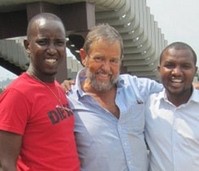As the Introduction to this issue of the e-letter emphasizes, the fact we all have the same basic energy systems is a great equalizer. However, as energy healing practitioners, skillfully attuning to cultural differences can be the difference between helping or failing to help a client.
David’s recent paper, Uses of Energy Psychology following Catastrophic Events, has quickly become one of the most widely viewed papers in one of the top psychology journals. Disaster relief teams are often working in a culture or subculture that is vastly different from their own. One of the pioneers in applying energy psychology in post-disaster settings, psychologist Carl Johnson, emphasized in an interview with David that treatment success can sometimes “hang on the use of a culturally or personally sensitive word.”
Dr. Johnson had done extensive work in Kosovo and Rwanda following the horrific genocides in the two countries. He told David about working with a former Kosovo Liberation Army soldier. The translator began, “He’s here for help with his war trauma.” Johnson explained the 0-to-10 Subjective Units of Distress scale and asked the man to give him a number for the intensity of his trauma.
The translator conferred with the man and then said, “No number, none.” Johnson asked, “Isn’t he here because he is suffering from trauma?” The translator restated, “No number, no trauma.” Johnson continued:
I sensed that while the man had come for help, he was also obeying the Albanian taboo which forbids suffering in males. I decided to bypass any mention of his suffering and said to the translator, “Okay, but could you ask him to just think about the traumatic event.” The response: “No traumatic event.”
It dawned on me that by definition, to qualify as a traumatic event, it would have had to cause a personal trauma, which he couldn’t admit to. So I asked if he had had a challenging experience, a bad moment that he had overcome.” To this, he could say “Yes.” So I had him think about the bad moment he had overcome. I asked him if he would enjoy having a tune-up on his strong body to get it ready for his next victory, like tuning up the engine of a magnificent race car that has won but needs to have a tune-up to win again.” He said, “That would be fine.”
As he focused on the event he had overcome, I used an energy assessment procedure to find and then treat his energy disruptions. Finally, when I could find no further disruptions in his energy system, I asked him if anything more had to be done or if the tune-up had been complete. He looked relaxed. Then he spoke through the translator: “He wants me to tell you he thanks you very much for healing his trauma.” Once the trauma had been resolved, it was no longer an issue for him to use the word.
Many variations of this story may be encountered by healing practitioners working with cultures or sub-cultures different from their own. Attuning to these particulars can make all the difference.

Dr. Johnson with Robert Ntabwoba and Jaques Sezikeye, who he trained to provide acupoint tapping treatments to people in local communities in Rwanda, circa 2009.
